Philosophy of Psychology and the Humanities (The Collected by Edith Stein,Marianne Sawicki,Mary Catharine Baseheart
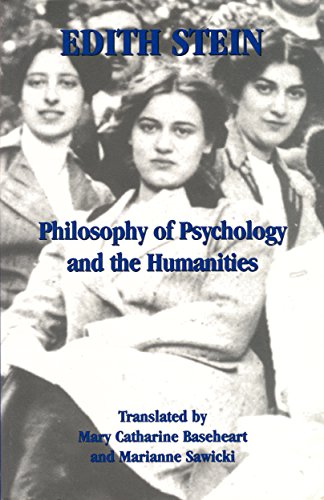
By Edith Stein,Marianne Sawicki,Mary Catharine Baseheart
More Information:
"Do i've got to?" is the main human of all questions. young children ask it while informed to fall asleep. Adults think of it whilst confronted with the calls for of the place of work, the relations, or their very own feelings and addictions. we discover ourselves continually poised among freedom and necessity.
during this quantity, her so much profound and punctiliously argued phenomenology of human creativity, Edith Stein explores the interaction of causal constraints and encouraged offerings. She demonstrates that actual occasions and physiological procedures don't completely ascertain habit; the power deployed for residing and creativity exceeds what involves us via actual capability. The human physique is a fancy interface among the cloth global and an both actual international of private value.
The physique opens besides to neighborhood. Stein exhibits that, strictly talking, there isn't a solitary person. groups are reservoirs of the which means and price that gas either our daily offerings and our once-in-a-lifetime accomplishments. This easy truth, she argues, is the place to begin for any conceivable political or social theory.
the 2 treatises during this booklet include her post-doctoral dissertation that Stein wrote to qualify for a educating activity at a German collage simply after the 1st international warfare. They ring with the enjoyment, desire, and self belief of a super younger student. this present day they proceed to problem the foremost colleges of twentieth-century psychology and cultural reviews, rather psychoanalytic idea and behaviorism. the following, too, is the highbrow manifesto of a girl who may move directly to develop into a Christian and a Carmelite nun, basically to be killed at Auschwitz like such a lot of others of Jewish ancestry.
The Ethics of Anthropology: Debates and Dilemmas by Pat Caplan
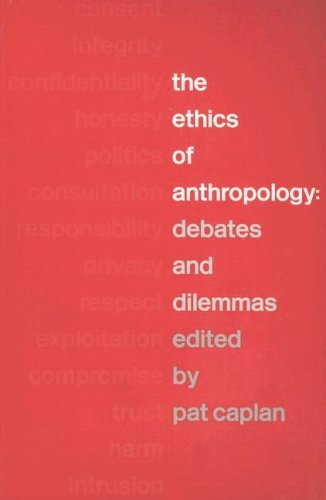
By Pat Caplan
"Was denkt ein New Yorker, wenn er in einen Hamburger by Caroline Heinrich,Peter Engelmann
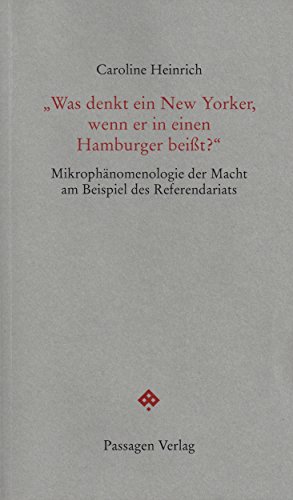
By Caroline Heinrich,Peter Engelmann
Die Macht, die in competition zum Denken steht, ist in autoritären Gesellschaften Realität, während in unseren Gesellschaften die Grenze zwischen Macht und Denken gefallen ist. Dies hat nicht zur Versöhnung geführt - zu einer Macht, die denkt - , sondern zur Entleerung von beidem: zur state of affairs der Anführungsstriche, zur Denkmacht, die weder Macht noch Denken ist, zu dem, used to be Jean Baudrillard als Simulation bezeichnet.
Am Beispiel des Referendariats beschreibt die Autorin die buchstäbliche Verwirklichung des Simulationsprinzips: den Unsinn, den eine solche Denkmacht produziert einerseits, den Zwang, die Entleerung des Denkens als geglückte Versöhnung der Differenz zu verstehen, andererseits. Ein alltägliches Machtverhältnis wird so zur Parabel für die Gewalt der Indifferenz.
Die Mischung von subjektivem Bericht und philosophischer Reflexion erweist sich als Anknüpfung an die antike culture, in der Leben und Denken noch nicht geschieden sind, sowie an die neuzeitliche culture der Essays von Michel de Montaigne.
Economics of Good and Evil: The Quest for Economic Meaning by Tomas Sedlacek,Vaclav Havel

By Tomas Sedlacek,Vaclav Havel
In The Economics of fine and Evil, Sedlacek significantly rethinks his box, demanding our assumptions in regards to the global. Economics is touted as a technological know-how, a value-free mathematical inquiry, he writes, yet it really is really a cultural phenomenon, a made of our civilization. it all started inside philosophy--Adam Smith himself not just wrote The Wealth of countries, but in addition the idea of ethical Sentiments--and economics, as Sedlacek indicates, is woven out of heritage, fantasy, faith, and ethics. "Even the main subtle mathematical model," Sedlacek writes, "is, de facto, a narrative, a parable, our attempt to (rationally) clutch the area round us." Economics not just describes the area, yet establishes normative criteria, selecting excellent stipulations. technological know-how, he claims, is a process of ideals to which we're dedicated. to know the ideals underlying economics, he breaks out of the field's confines with a travel de strength exploration of monetary considering, greatly outlined, over the millennia. He levels from the epic of Gilgamesh and the previous testomony to the emergence of Christianity, from Descartes and Adam Smith to the consumerism in struggle membership. all through, he asks looking meta-economic questions: what's the which means and the purpose of economics? do we do ethically all that we will be able to do technically? Does it pay to be good?
Placing the knowledge of philosophers and poets over strict mathematical types of human habit, Sedlacek's groundbreaking paintings offers to alter the best way we calculate fiscal value.
Kompetent in Gruppen lernen?: Wie muss kooperatives Lernen by Sabrina Bock

By Sabrina Bock
Essays: Neu übersetzt aus dem Englischen von Michael by Francis Bacon,Michael Siefener
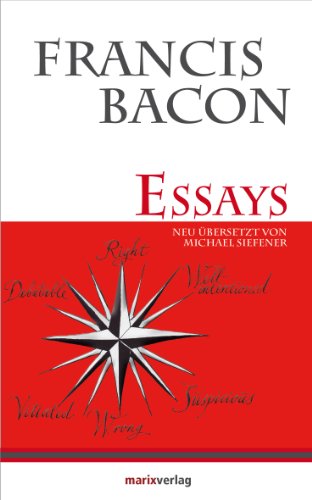
By Francis Bacon,Michael Siefener
Bonhoeffer's Black Jesus: Harlem Renaissance Theology and an by Reggie L. Williams
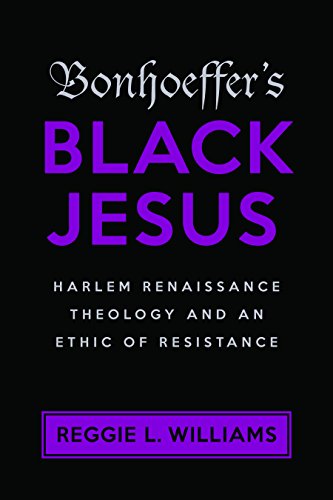
By Reggie L. Williams
In this publication writer Reggie L. Williams follows Bonhoeffer as he defies Germany with Harlem’s black Jesus. The Christology Bonhoeffer discovered in Harlem’s church buildings featured a black Christ who suffered with African americans of their fight opposed to systemic injustice and racial violence—and then resisted. within the pews of the Abyssinian Baptist Church, below the management of Adam Clayton Powell, Sr., Bonhoeffer absorbed the Christianity of the Harlem Renaissance. This Christianity incorporated a Jesus who stands with the oppressed instead of joins the oppressors and a theology that demanding situations the way in which God can be utilized to underwrite a union of race and religion.
Bonhoeffer’s Black Jesus argues that the black American narrative led Dietrich Bonhoeffer to the fact that obedience to Jesus calls for concrete ancient motion. This ethic of resistance not just indicted the church of the German Volk, but additionally maintains to form the character of Christian discipleship today.
Computer Ethics (The International Library of Essays in by John Weckert
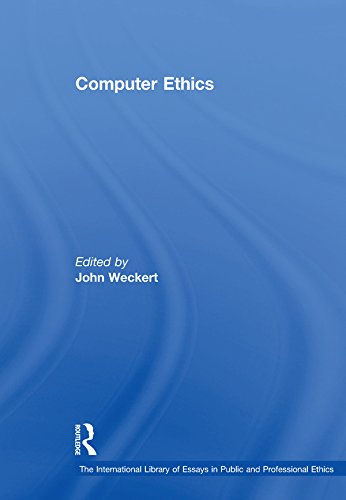
By John Weckert
An Anthropology of Ethics (New Departures in Anthropology) by Faubion

By Faubion
Virtue as Social Intelligence: An Empirically Grounded by Nancy E. Snow
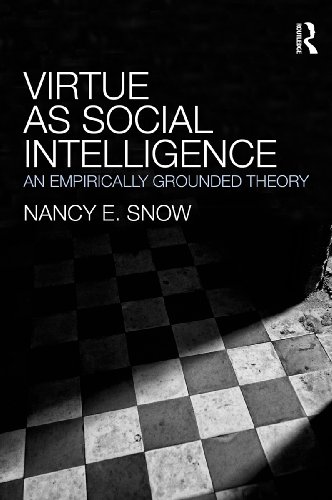
By Nancy E. Snow
Virtue as Social Intelligence: An Empirically Grounded Theory takes at the claims of philosophical situationism, the moral concept that's skeptical concerning the risk of human advantage. motivated through social mental reports, philosophical situationists argue that human character is simply too fluid and fragmented to help a reliable set of virtues. They declare that advantage can't be grounded in empirical psychology. This ebook argues another way.
Drawing at the paintings of psychologists Walter Mischel and Yuichi Shoda, Nancy E. Snow argues that the social mental experiments that philosophical situationists depend on examine the incorrect types of occasions to check for behavioral consistency. instead of events which are objectively related, researchers have to examine events that experience related meanings for the subject. while this is often performed, matters convey behavioral consistencies that warrant the attribution of putting up with features, and virtues are a subset of those features. advantage can hence be empirically grounded and advantage ethics has not anything to worry from philosophical situationism.